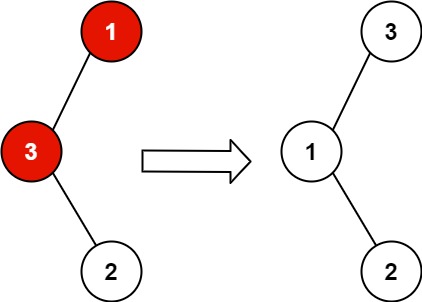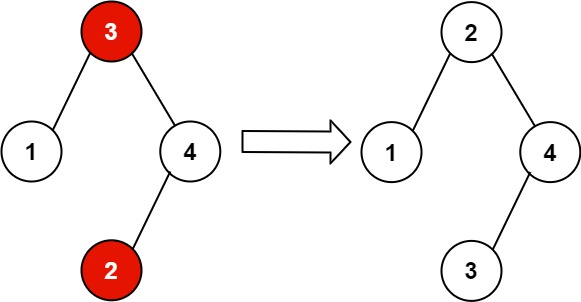Description
Topics
Companies
You are given the root of a binary search tree (BST), where the values of exactly two nodes of the tree were swapped by mistake. Recover the tree without changing its structure.
Example 1:

Input: root = [1,3,null,null,2] Output: [3,1,null,null,2] Explanation: 3 cannot be a left child of 1 because 3 > 1. Swapping 1 and 3 makes the BST valid.
Example 2:

Input: root = [3,1,4,null,null,2] Output: [2,1,4,null,null,3] Explanation: 2 cannot be in the right subtree of 3 because 2 < 3. Swapping 2 and 3 makes the BST valid.
Constraints:
- The number of nodes in the tree is in the range
[2, 1000]. -231 <= Node.val <= 231 - 1
Follow up: A solution using O(n) space is pretty straight-forward. Could you devise a constant O(1) space solution?
Code
KEY: 正確的 Binary Search Tree 的 inorder traversal 會是 sorted 。
要注意 The first element is always larger than its next one while the second element is always smaller than its previous one.
Time Complexity: , Space Complexity:
/**
* Definition for a binary tree node.
* struct TreeNode {
* int val;
* TreeNode *left;
* TreeNode *right;
* TreeNode() : val(0), left(nullptr), right(nullptr) {}
* TreeNode(int x) : val(x), left(nullptr), right(nullptr) {}
* TreeNode(int x, TreeNode *left, TreeNode *right) : val(x), left(left), right(right) {}
* };
*/
class Solution {
public:
TreeNode* firstError = nullptr;
TreeNode* secondError = nullptr;
TreeNode* prev = new TreeNode(INT_MIN);
void recoverTree(TreeNode* root) {
inorder_traversal(root);
swap(firstError->val, secondError->val);
}
void inorder_traversal(TreeNode* node) {
if(!node)
return;
inorder_traversal(node->left);
if(firstError == nullptr && prev->val >= node->val)
firstError = prev;
if(firstError != nullptr && prev->val >= node->val)
secondError = node;
prev = node;
inorder_traversal(node->right);
}
};